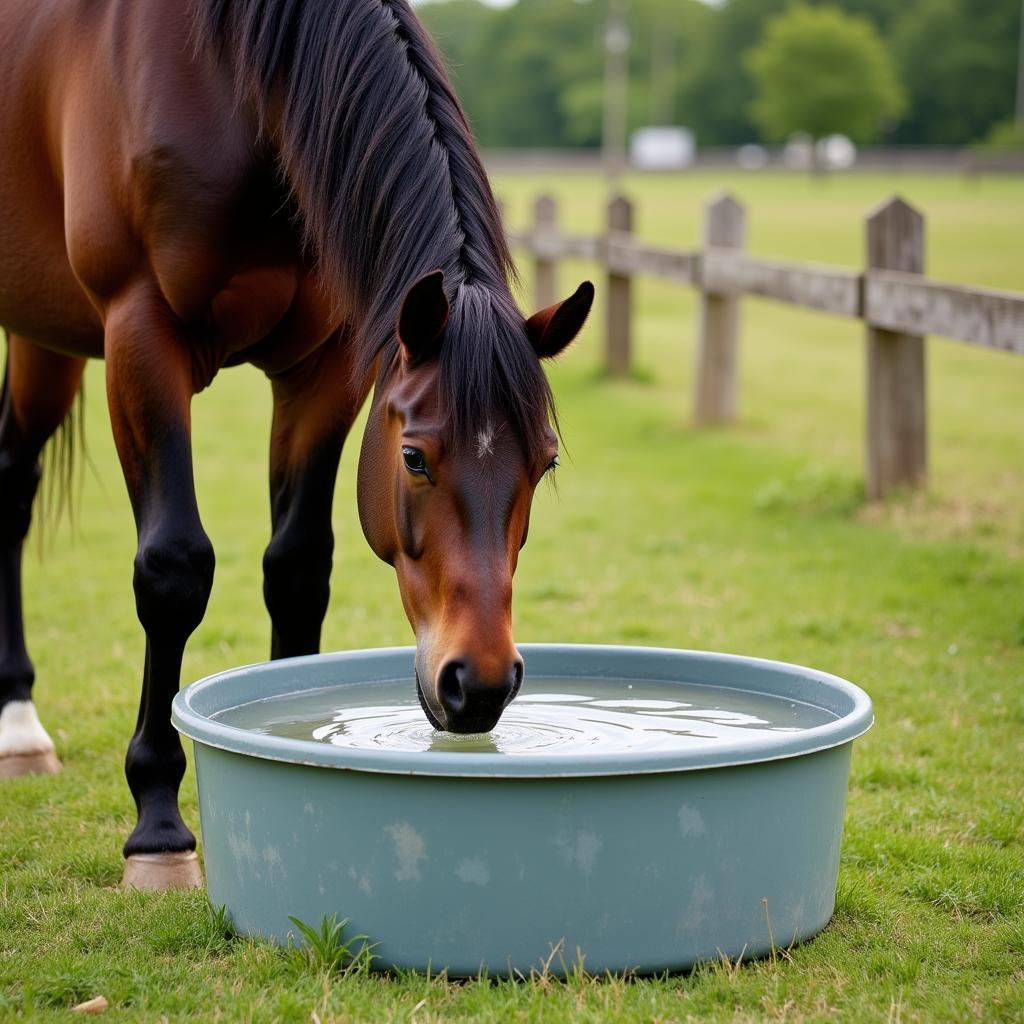Horse Mineral Tubs are a common sight in pastures and stables, but their importance often goes overlooked. Providing essential minerals and nutrients, these tubs play a vital role in maintaining a horse’s overall health and well-being. Selecting the right horse mineral tub can be crucial in addressing specific deficiencies and supporting optimal performance.
Why Are Horse Mineral Tubs Important?
Horses, like all living creatures, require a balanced diet to thrive. While forage and grain provide a substantial portion of their nutritional needs, they may lack certain essential minerals. This is where horse mineral tubs come in. They supplement the diet, ensuring your horse receives adequate amounts of vital minerals like calcium, phosphorus, salt, and trace elements like zinc, copper, and selenium. A deficiency in these minerals can lead to a variety of health problems, from poor coat condition and weakened hooves to more serious issues like anemia and skeletal problems.
Having a readily available horse tub filled with minerals allows horses to self-regulate their intake based on their individual needs. This is particularly beneficial for horses on pasture, where mineral content in the forage can vary.
Choosing the Right Horse Mineral Tub: A Guide
With so many different horse mineral tubs available, selecting the right one can be daunting. Consider these factors:
- Age and activity level: Young, growing horses and those involved in strenuous activity have higher mineral requirements.
- Forage type and quality: The mineral content of hay and pasture varies considerably, influencing the type of supplementation needed.
- Specific needs: Some horses may require mineral tubs formulated for particular conditions, such as those with hoof problems or electrolyte imbalances.
- Climate: Hot and humid climates can lead to increased sweating and electrolyte loss, necessitating a mineral tub with higher electrolyte content.
Benefits of Using a Horse Mineral Tub
The advantages of providing a horse mineral tub extend beyond simply meeting basic mineral requirements:
- Improved overall health: Adequate mineral intake supports strong bones, healthy hooves, a vibrant coat, and proper muscle function.
- Enhanced performance: Minerals are essential for energy production, nerve function, and muscle contraction, contributing to optimal athletic performance.
- Increased appetite and digestion: Certain minerals, such as sodium chloride (salt), can stimulate appetite and improve digestion.
- Reduced risk of deficiencies: Mineral tubs help prevent deficiencies that can lead to serious health problems.
Providing horse popsicles during hot weather can also help supplement electrolytes and keep your horse hydrated.
Common Questions About Horse Mineral Tubs
- How much will my horse consume? Horses will typically consume 1 to 4 ounces of mineral per day, depending on their individual needs and the mineral content of their diet.
- Where should I place the mineral tub? Place the tub in a dry, accessible location, away from water sources to prevent contamination and encourage regular consumption.
“Proper mineral supplementation is a cornerstone of equine health,” says Dr. Emily Carter, DVM, specializing in Equine Nutrition. “Mineral tubs provide a convenient and effective way to ensure your horse receives the essential nutrients they need to thrive.”
 Horse Licking a Mineral Tub in Pasture
Horse Licking a Mineral Tub in Pasture
Potential Issues and Considerations
While generally safe, certain precautions should be taken with horse mineral tubs:
- Overconsumption: While rare, excessive intake of certain minerals can be harmful. Monitor your horse’s consumption and consult with a veterinarian if you suspect overconsumption.
- Quality control: Choose high-quality mineral tubs from reputable manufacturers to ensure the correct balance of minerals and avoid potential contaminants.
- Weather protection: In rainy or humid climates, consider using a covered mineral feeder to prevent the tub from dissolving or becoming contaminated.
For horses prone to ingesting sand, consider adding a sand purge for horses to their diet.
“Don’t underestimate the impact of seemingly small dietary additions,” advises Sarah Miller, an experienced equine nutritionist. “A simple mineral tub can significantly improve a horse’s overall well-being and prevent long-term health issues.”
Conclusion
A horse mineral tub is a simple yet powerful tool for maintaining your horse’s health and vitality. By understanding the importance of mineral supplementation and selecting the right tub for your horse’s individual needs, you can contribute significantly to their long-term well-being. Choosing a high-quality horse lick tubs with fly control can address multiple needs at once. Don’t underestimate the impact of this essential supplement.
FAQ
- Are all mineral tubs the same? No, mineral tubs vary in their composition to meet the specific needs of different horses.
- Can I give my horse too many minerals? Yes, excessive intake of certain minerals can be harmful. Monitor consumption.
- What are the signs of a mineral deficiency? Signs can include poor coat condition, weakened hooves, and lethargy.
- How do I choose the right mineral tub? Consider age, activity level, forage type, and specific needs.
- Where should I place the mineral tub? In a dry, accessible location, away from water sources.
- Can mineral tubs help with fly control? Some mineral tubs contain fly control ingredients.
- Are mineral tubs necessary for all horses? Consult with a veterinarian to determine if your horse requires supplementation.
For owners of lazy horses, ensuring proper nutrition, including mineral intake, is vital for maintaining energy levels and overall health.
When you need assistance, please contact us by Phone: 0772127271, Email: [email protected] Or visit our address: QGM2+WX2, Vị Trung, Vị Thuỷ, Hậu Giang, Việt Nam. We have a 24/7 customer service team.